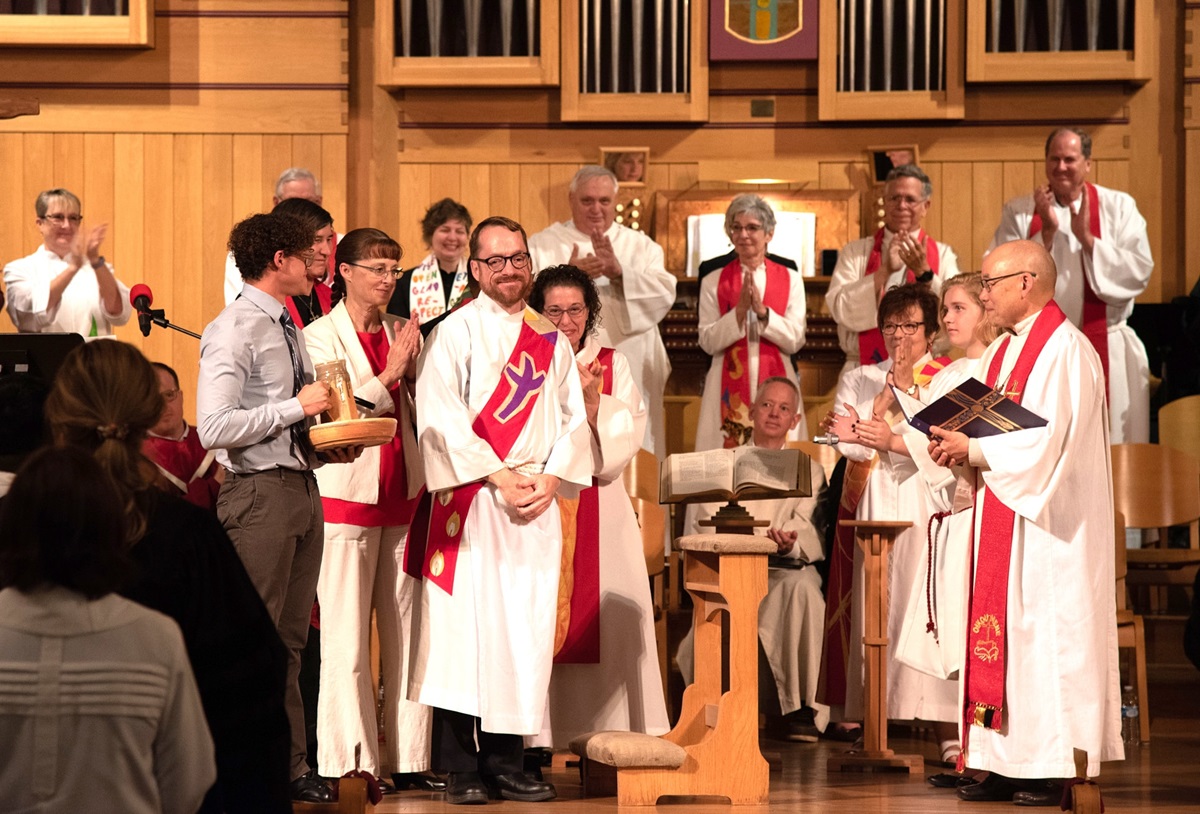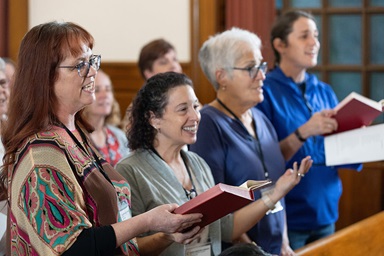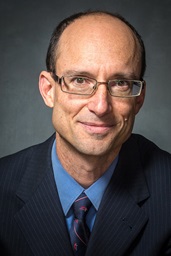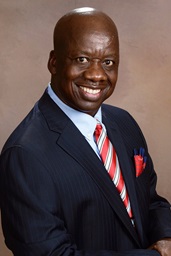When he received his deacon stole and got a standing ovation from the Desert Southwest Conference at his ordination, the Rev. Joshua L. Warner thought, “This is the moment of my arrival.”
“I have been in the closet most of my life,” said Warner, who is a gay man. “To be out in the denomination is different for me. I didn’t think it was going to be a reality for me to be ordained.”
But his ordination by Bishop Robert T. Hoshibata is just another stop on a long journey, he said.
“It was extremely important to me that Bishop Hoshibata ordained me,” Warner said. “From the moment he started working with us in 2012, I have felt nothing but support from him and his office.”
Warner said when he was commissioned in 2017, it was the first time in his life he felt “genuinely accepted” by his peers.
Hoshibata spoke of his respect for Warner.
“I have been in Desert Southwest for seven years and have known Joshua since I arrived. I have come to respect his integrity. He is a person deeply committed to his ministries,” Hoshibata said.
The Book of Discipline, the United Methodist policy book, says that the practice of homosexuality “is incompatible with Christian teaching,” and bars “self-avowed practicing homosexuals” from ordination in the church. Despite passage of legislation during General Conference 2019 that confirmed this stance and toughened penalties, resistance has been strong. In addition to Warner, LGBTQ people have been commissioned or ordained in the Baltimore-Washington, Michigan, North Texas, Northern Illinois and Oregon-Idaho conferences in the past month.
Warner has faced many challenges.
He grew up in Montana and was the victim of a hate crime due to his sexuality when he was 17.
“At the age of 18, I came out to my church, the International Church of the Four Square Gospel, and my family,” he said. “I was asked to leave my church.” Although his family rejected him at the time, he has now reconciled with his mother.
Because of the “extreme bullying” he faced as a young person, he said it was important to him that all the clergy in the conference accept him.
Now a deacon in full connection, Warner’s primary appointment is to La Frontera Empact, a suicide prevention center that offers behavioral health services for children and families. As a case manager, he works with children and young adults at high risk. His secondary appointment is to Faith United Methodist Church in Phoenix as minister of pastoral care.
The church identifies as a Reconciling congregation, and the pastor, the Rev. Michael Patzloff, is also gay.
Patzloff was ordained 25 years ago.
“I did not think there would be a time in which folks who were openly LGBTQ would be ordained in our denomination,” he said. “It is a pleasure to serve in a congregation that is Reconciling and is supportive and welcoming of both Joshua and I as well as those in our church and community who are LGBTQ.”
Patzloff said he continues to have hope for The United Methodist Church.
“There are a lot of people out there who are looking for committed, called pastors and sexual orientation does not matter.”
Hoshibata said he and Warner talked about the outcome of the 2019 General Conference.
“We were honest with one another about the challenges presented by the legislation adopted. It is clear he continues to hold as precious his relationship with The United Methodist Church,” Hoshibata said.
Hoshibata said the work Warner does, supporting and caring for young people at high risk, is challenging and difficult.
“I have always appreciated that he responds to his call with that kind of servant heart,” Hoshibata said. “It is clear from my interactions with Joshua that he has a pastor’s heart.”
Warner is someone who loves all people and embraces them with God’s love, Hoshibata said.
Warner is single and has a 20-year-old tri-racial son whom he adopted from foster care when the boy was 10. He said he continues to pray and discern about what the future holds.
“I want to be known first as a human being, second as a pastor and third as being a queer person,” he said.
Gilbert is a news writer for United Methodist News Service. Contact her at (615) 742-5470 or newsdesk@umcom.org. To read more United Methodist news, subscribe to the free Daily or Weekly Digests.
Like what you're reading? Support the ministry of UM News! Your support ensures the latest denominational news, dynamic stories and informative articles will continue to connect our global community. Make a tax-deductible donation at ResourceUMC.org/GiveUMCom.




